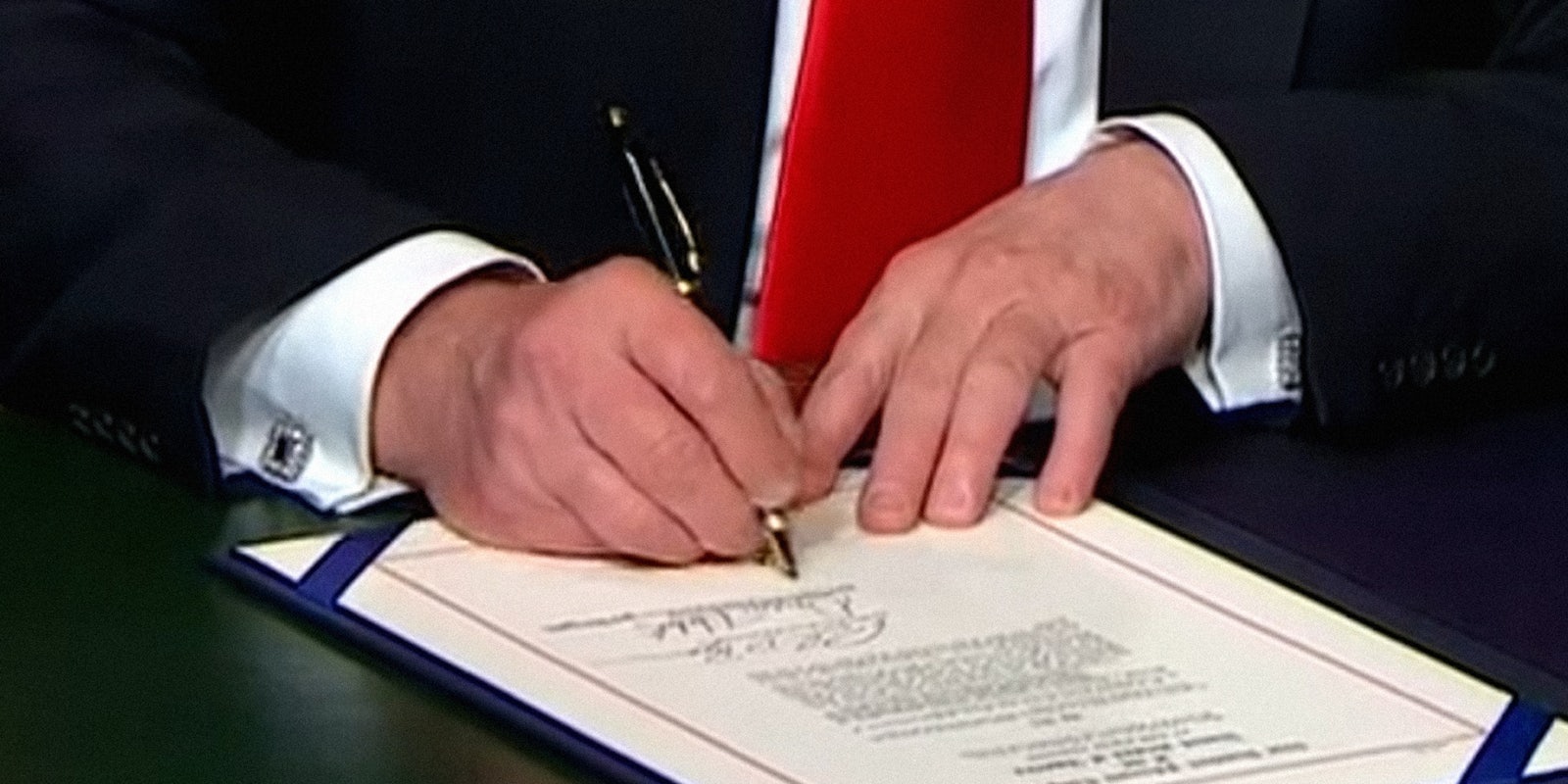President Donald Trump signed an executive order on Friday that would ban Syrian refugees and citizens of seven different Muslim-majority nations from entering the United States.
Trump said the executive action would implement new vetting procedures that would “keep radical Islam” out of the United States.
The document’s signing officially suspends the issuance of new visas for citizens of the following nations for the next 90 days: Iran, Iraq, Libya, Somalia, Sudan, Syria, and Yemen.
During that period of time, the Department of State, Department of Homeland Security, and director of National Intelligence will come up with a list of countries that lack adequate vetting standards to ensure that those who come to the United States are not a threat.
Those nations will then have 60 days to implement better screening standards or risk their inhabitants being barred from the United States indefinitely.
The executive order would also postpone admitting Syrian refugees indefinitely. It would suspend the U.S. refugee program for 120 days.
“I don’t want them here,” said Trump, following a ceremony honoring the swearing in of Defense Secretary James Mattis. “We will never forget the lessons of 9/11. Nor the heroes who lost their lives at the Pentagon. We will honor them not only with our words, but with our actions, which is what we’re doing today.”
The 9/11 hijackers were citizens of Saudi Arabia, the United Arab Emirates, Egypt, and Lebanon. None of those countries are impacted by the visa ban.
Immigration attorneys also say they are advising clients who are citizens of the seven affected countries—even those with valid U.S. visas or U.S. permanent residency—from leaving and re-entering the United States. The ban does not appear to impact U.S. citizens who are born in the these countries.
“A visa itself is simply an entry document, so for citizens of countries subject to the entry ban who are currently in the U.S. with a valid immigration status, the EO does not appear to impact their ability to remain in the U.S.; it does, however, restrict their ability to travel internationally because once they travel outside the U.S., they would not be able to return while their country of origin is still subject to the ban,” attorneys from the Maggio-Kattar immigration law firm in Washington, D.C., told the Daily Dot via email.
Jamal Abdi of the National Iranian-American Council noted that he believed the 90-day ban would likely turn into a permanent ban.
“For Iran, mindful of the tensions between U.S. and Iranian governments we are skeptical that Iran would comply with such requirements or that, if it did comply, the Trump Administration would accept such efforts. This would, in effect, mean a permanent ban on entry for Iranians,” he wrote on the organization’s blog.
The executive order allows Homeland Security Secretary John Kelly to add additional countries to the banned list as needed. It also allows Kelly and the secretary of state to admit individuals from the banned list as needed.
Security standards for the Syrian refugee program would be reevaluated under the executive order. Trump has expressed a willingness to help Syrian Christians.
The executive order makes two exceptions under the temporary suspension of the refugee program; religious minorities and any person that would “enable the United States to conform its conduct to a preexisting international agreement.”
Trump’s suspension of the refugee program falls on Holocaust Remembrance Day.
House Minority Leader Nancy Pelosi (D-Calif.) condemned the executive actions in a statement.
“Today’s executive actions dishonor our values and do not address the threat of terrorism. Americans of all faiths must confront and reject any attempt to target for exclusion or discrimination anyone on the basis of their religion,” said Pelosi.
Hours after Trump signed the executive order, the Council of American-Islamic Relations announced on Friday that it was filing a federal lawsuit challenging the constitutionality of the executive order.
“The courts must do what President Trump will not—ensure that our government refrains from segregating people based on their faith,” said Attorney Gadeir Abbas, Esq., who is co-counsel on the lawsuit, in a press release issued by CAIR.
Update 11:58am CT, Jan. 28: According to a Reuters report, Trump’s executive order also bans people from those seven countries who hold green cards, which makes them permanent U.S. residents.
“It will bar green card holders,” Gillian Christensen, acting Department of Homeland Security spokeswoman, told Reuters.
